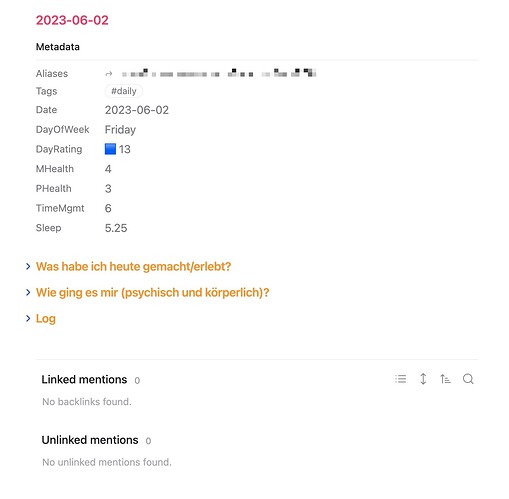I have finally started using Obsidian and I try to keep things simple. The whole structure isn’t final yet. This is my current folder structure:
- Attachments
- Journal
- People
- Templates
I use tags as my “note types”:
- “#daily”
- “#weekly"
- “#reference (nested with e.g.: /meeting, /article, /youtube, …)"
- “#permanent"
- “#person"
- “#myasset (nested with e.g.: /ict/hardware, /ict/software …)"
The community plugin I use are: Calendar, Periodic Notes and Dataview.
The YAML frontmatter in my daily notes:
- Daily Rating → Colour and a number 0-21, the number is summed up from the following:
- Mental Health → number from 1-7 ( = 33% of the Daily Rating)
- Physical Health → number from 1-7 ( = 33% of the Daily Rating)
- Time Management (did I use my day well?) → number from 1-7 ( = 33% of the Daily Rating)
- Hours of sleep tracking
I’m still not sure, if it makes sense to have the YAML frontmatter in English but everything else in German (I’m Swiss and speak Swiss-German). I’m not sure yet, if this could have more advantages or disadvantages (for example when searching something)?
The questions in my Daily Note are (I’m currently try this out to see if it works for me):
-
What have I done/experienced today?
→ I’m not sure if I should link to reference notes from here. E.g. if I write something like “I’ve visited doctor X”, I don’t know if it makes sense to link to the according meeting note(?). -
How did I feel today (mentally and physically)?
-
Log
→ Here I write down some quick notes like thoughts, ideas, information from other people, summary of phone calls or messages (I assume it doesn’t make a lot of sense to create a “#reference/meeting” note for calls or messages?).
My Questions and insecurities:
One of my goals is to be able to have a dataview list/table somewhere where I can have an overview over my health (so that I can filter and remember when I had problem X the last time or when I felt good or bad and be able to give an answer to my doctor). Maybe it even helps me to see connections like “I often got sick when I did xy”?
I’m not sure where I should try to create this overview? Where does it make sense to have? Should I try to create a “person note” for myself (??) or maybe a permanent note with the title “Health” (or better several smaller ones like “Physical Health”, “Mental Health”, etc.)?
The problem I have is that I’m really not sure if I should separate all my personal information (personal statistics/log) from my other “common knowledge” about the same topic?
For example: Should I have a “Physical Health” permanent note and in there a block called something like “my Physical Health” with my own health log?
Although I’m not a doctor or a student and I don’t try to create a health Wikipedia or something, I assume that without planning in advance, I could get a logical/structural problem with my vault. Let’s assume I make a “Physical Health” note, where I try to insert a dataview table to have an overview over my physical health entries/log from my daily notes and from my doctor visits (#reference/meeting) combined. Maybe I find an interesting article about Physical Health in general in the future. Would it make sense to store this information in the same note where also the dataview table about my physical health is located?
How do you handle/combine such “personal data” together with your knowledge? I’m grateful for every tip and/or explanation about your solution.
Many thanks in advance!
